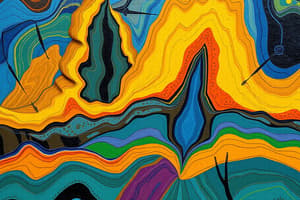Podcast
Questions and Answers
Fossils of the same type are never found thousands of miles apart on different continents.
Fossils of the same type are never found thousands of miles apart on different continents.
False (B)
Engineers can reduce earthquake damage to buildings.
Engineers can reduce earthquake damage to buildings.
True (A)
Communities cannot better protect themselves from tsunamis.
Communities cannot better protect themselves from tsunamis.
False (B)
Scientists can predict when a volcano is going to erupt with absolute certainty.
Scientists can predict when a volcano is going to erupt with absolute certainty.
Communities can prepare for landslide hazards.
Communities can prepare for landslide hazards.
People cannot protect themselves from the hazards of landslides.
People cannot protect themselves from the hazards of landslides.
How do scientists know that Earth is made up of layers?
How do scientists know that Earth is made up of layers?
Why are some communities more likely to experience an earthquake than others?
Why are some communities more likely to experience an earthquake than others?
How can engineers reduce earthquake damage to buildings?
How can engineers reduce earthquake damage to buildings?
Can scientists predict when a volcano is going to erupt?
Can scientists predict when a volcano is going to erupt?
How does erosion affect Earth’s surface, people, and communities?
How does erosion affect Earth’s surface, people, and communities?
Flashcards are hidden until you start studying
Study Notes
Fossils and Continental Distribution
- Fossils of the same type are typically found in close proximity, suggesting species inhabit the same regions rather than being widely dispersed between continents.
Earthquake Preparedness and Engineering
- Engineers employ innovative designs and materials to create structures that withstand seismic forces, minimizing earthquake damage.
- Communities can enhance preparedness through education, early warning systems, and establishing emergency response plans.
Tsunami Vulnerability
- Many communities lack sufficient resources or strategies to effectively safeguard against the destructive impacts of tsunamis.
Volcano Eruption Prediction
- Scientists cannot predict volcanic eruptions with absolute certainty; however, they monitor signs like gas emissions, ground deformation, and seismic activity to assess potential risks.
Landslide Risks and Community Action
- Communities can take preventive measures against landslides by proper land use planning, vegetation management, and constructing drainage systems.
- Individuals often face challenges in protecting themselves from landslide hazards due to unforeseen or rapid onset events.
Earth's Layered Structure
- The structure of Earth is known to be layered based on seismic wave studies, which indicate different behavior through various materials.
Earthquake Frequency in Communities
- Some communities are more likely to experience earthquakes due to their location along tectonic plate boundaries where stress accumulation leads to seismic activity.
Erosion and Its Impact
- Erosion can reshape Earth's surface, leading to habitat loss, soil degradation, and increased vulnerability to natural disasters.
- Affects human activities such as agriculture, infrastructure stability, and community planning, necessitating adaptive measures.
Studying That Suits You
Use AI to generate personalized quizzes and flashcards to suit your learning preferences.




